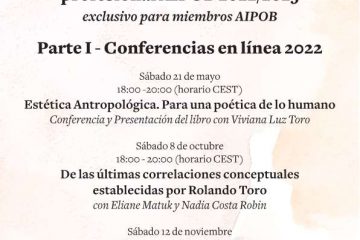Let’s start with some suggestions on how Respect is understood.
– “Speaking with respect “:
It has always been an affirmation that I find a little comical. I imagine an obsequious person who exaggerates or is afraid of not expressing themselves well or offending with their language. They know that using a “strong” word can offend, but they also know that they are not able to use another one, or have decided that this is the right word.
– “Respecting a person“:
This reminds me of a hierarchical relationship of power where it is obvious who is in command and who executes, and there is no discussion.
– “Fear of God and Respect“:
In front of a higher being, respect mutates into fear. Only a loving conception of those who hold absolute power allows us to replace fear with respect. As a child, for my culture, and me respect and fear of punishment coincided.
– “Enjoy my respects“:
Luckily this is not used anymore, it has always made me feel uncomfortable. It feels oily or false, remaining on the skin and hiding a desire to be evaluated by those who are more powerful precisely in virtue of their submission. But it is also sham inferiority to emphasize the superiority of the other through a formula of gallantry.
– “Demanding, expecting respect”:
It is I, by my will and/or desire, that I place myself in the condition to receive a “careful and respectful regard” (re-gard, look again to see better, to be careful).
– “Deserving respect”:
It is recognized that the recipient of respect has a certain quality in which they excel, with which they distinguish themselves. It is the semantic equivalent of “respectable”.
– “Having respect for …”
You can have respect for a person, an animal, an object, or an environment. Here the sense changes, if in the previous examples there was a relationship of strength, in this case the respect becomes gentler.
It assumes the value of renouncing damaging something or someone. But, this perspective is still about being in a relationship with those above and below, only this time is the “generous or dutiful” action of those on top. “Sometimes you leave the scraps of paper lying around, but I do not, I have respect for shared spaces”. In the face of the power to “ruin” something, one chooses the power of doing or not doing something that is “good for others, there where I am directing this piece”.
But “having respect for …” is also, increasingly, in a dimension of equality, of mutual reflection. Respect assumes a horizontal dimension of equality and solidarity. This, in my opinion, is the highest form of “respect”: my identity “re-mirrors” the identity of the other. “Respect = re-watch” there is also a value of “looking out for, respect”.
Let’s take a look at the Constitution.
– “In compliance with the rules, the laws”:
in this sense the Italian Constitution uses the term “respect” in 5 articles. So we are still in the presence of something “superior” that shapes the concrete behaviours we should have.
But there is an article in our Constitution (n.32) which says: “The law cannot in any case violate the limits imposed by respect for the human person”. Therefore: respect for the human person comes above the law.
Thus I can close this review reassured by Respect being a right for everyone, so much so, as be worth more than the law, in fact, if I had to manage it, it would be non-negotiable.
– Let’s take another step and stay in our Constitution.
The “human person”, according to the art. 3, is worthy of respect (“All citizens have equal social dignity and are equal before the law, without distinction of sex, race, language, religion, political opinions, personal and social conditions.“).
Also the art. says (“Private economic initiative is free. It cannot be carried out in contrast with social utility or in a way that damages security, freedom, human dignity.”)
What can I deduct? That negative discriminations damages human dignity, that is, who does not respect, should be avoided.
Positive discrimination allows us to take care of a minority, giving it more attention, i.e. “removing the obstacles that impede the development and freedom of the person”. These are the obstacles that impede the dignity and freedom of people and must be removed both by means of law and by the concrete action of society, including private economic action.
Therefore: respect and discrimination are inseparably connected.
What does Biodanza say?
The methodology and aims of Biodanza are strongly rooted in these two ethical principles, which are also sentiments: “respect and discrimination”. Often Biodanza operators act on these two feelings, they induce them in their students, sometimes even unknowingly.
Yes! “Even unknowingly” because respect, the recognition of the dignity of the other, is inherent in the same methodology of Biodanza found in feedback and in affectivity, which are the two fundamental cornerstones of Biodanza.
– Feedback in Biodanza
Many Biodanza exercises and some methodological principles are carriers of respect and non-discrimination. I refer, by way of example only, to “feedback” as a method, which is persistently proposed in all the pair exercises.
The dance that takes place is not guided by one of the two, but it is the achievement of a common dance that goes beyond and integrates two people and their rhythms, their sensations, their tonicity.
Only by respecting the space of the other, their proposals for movements, can I lay my proposal of closeness or distance, my proposal of speed or slowness, and my degree of tonicity. The collective dance that contains and exalts each other is created through mutual listening to the feedback of the other.
Feedback and affective movement
– Affectivity in Biodanza.
Rolando Toro always insisted on “Affectivity”, giving it the status of one of the five lines of vivencia.
Here are some quotes from the book “Biodanza. Existential integration and human development through music, movement and the expression of emotions “(pages 88 and 89)
“Affectivity … is a state of profound affinity towards human beings, capable of giving birth to feelings of love, friendship, altruism, motherhood, fatherhood, solidarity.”
When we recognize in the other, in the citizen, the same freedom that renders us alive we are living that sense of profound affinity.
When the Constitution places the dignity of people over the Constitution itself, and defends civil and political liberties as a common good of all people, a world is being proposed in which affectivity directs and generates the fundamental relationships among people of all Nations.
Not to mention the sense of solidarity that pervades whole Constitution, sometimes explicitly, sometimes implicitly. What is this solidarity if not “applied affectivity”?
“Through affectivity we identify with other people and we are able to understand them, love them, protect them, but also repudiate and attack them.”
“The pathological forms of affectivity are expressed in destructiveness, in social discrimination, in racism, in injustice and in self-destructive impulses“.
Here, the fundamental distinction between “positive and negative discrimination” is recalled: when we understand, love, and protect the other we are acting out positive discrimination, which promotes action to remove obstacles for the fulfilment of the other.
When affection (in its pathological form) induces rejection, aggression, disqualification, then we are in the presence of negative discriminations, that which distinguishes between people of different sex, race, language, religion, political opinions, personal conditions that are denied by Article 3 of the Constitution.
“Ethical relativism” is a pathological form of affectivity and consists in justifying infamous actions with intelligent reasoning. This attitude is typical of totalitarian governments and individualistic people.”
The democracy that is protected by our Constitution, the distinction of the powers that are so precisely delineated in it, wants to put a large restraint on the possibilities of having totalitarian governments or systems. This is to avoid absurd reasoning like the ones related to the “pure Italian race”. These wanted to establish a clear distinction of domination between Italians and Africans and between Italians and Jews. The coverage of this “ethical relativism” also occurred through a “manifesto of the race” signed by some scholars of the time.
In conclusion
I conclude with the words of the poet Wislawa Szymborska who has masterfully expressed this concept:
“Listen to how hard your heart beats me”.
How extraordinary is the evocative power of this poetic rhyme!
Your heart beats to me: it beats me hard.
I ask you to try the same for me by listening to my beating heart.
Neurological studies have evidenced that mirror neurons give a profoundly physiological meaning to this poem.
But all this is in perfect harmony with the deeper concept of “respect”:
Listen to the freedom and dignity of the other in me.
Recognizing that every other person breathes their own freedom as I breathe it, which is their dignity, their worth being identical to mine, is the essential foundation of all peaceful and democratic coexistence
In this sense, Feedback and Affectivity are the ” methodology of Biodanza ”
but also refer to the conception of society
as it is designed by our Constitution.
This article is taken from the speech given in the occasion of the seminar: “Respect is a right of all” at the House of Rights, City of Milan.
Salvatore Mirante
Biodanza Conductor and Tutor, I have always been interested in the community and the communal aspects of the Biodanza method. The group and its vitality, its personality as a continuous focus to work on, in specific organizations and user groups. In addition to conducting a weekly group for some years, I have conducted, almost always in co-conduction, projects for the helping professions (Social Workers and Educators) and for groups of parents with specific problems such as the parenting of LGBT people.


0 Comments